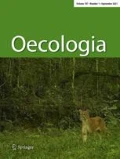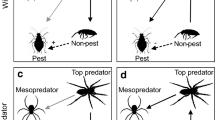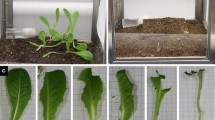Abstract
The strength and outcome of mutualistic interactions can be highly dependent on the combination of traits of the species involved. Distinct foraging strategies (e.g., hunting mode) of mutualistic predators may cause predator–prey interactions to vary, potentially affecting the strength of trophic cascades. We evaluate the causes of variation in the strength of spider–plant mutualisms by focusing on contrasting hunting modes of two spiders: an actively hunting lynx spider (Peucetia sp.) and a sit-and-wait crab spider (Misumenops argenteus). We manipulated spider species composition by assigning each plant to one of the following treatments: (1) no spiders; (2) sit-and-wait spiders only; (3) actively hunting spiders only; (4) actively hunting + sit-and-wait spiders. We then examined the independent and interactive effects of spider species on floral herbivory and fitness of the glandular trichome-bearing plant, Trichogoniopsis adenantha (Asteraceae). Both spider species increased plant fitness by suppressing herbivores and increasing ovary fertilization, but the overall net benefit of spiders was contingent on spider hunting mode. Sit-and-wait spiders promoted stronger positive cascading effects compared to actively hunting spiders. The combination of spider species suppressed herbivores in an additive manner; their combined impact on plant fitness, however, was lower than expected, suggesting that the inter-specific interaction between spiders is slightly antagonistic. Thus, both spider species combined weakened the strength of this spider–plant mutualism. Our findings offer a general framework for understanding the critical role of predator foraging mode in trophic cascades.




Similar content being viewed by others
References
Bernays EA (1997) Feeding by lepidopteran larvae is dangerous. Ecol Entomol 22:121–123. https://doi.org/10.1046/j.1365-2311.1997.00042.x
Brechbühl R, Casas J, Bacher S (2011) Diet choice of a predator in the wild: overabundance of prey and missed opportunities along the prey capture sequence. Ecosphere 2(12):1–15. https://doi.org/10.1890/ES11-00323.1
Cardinale BJ, Srivastava DS, Emmett Duffy J et al (2006) Effects of biodiversity on the functioning of trophic groups and ecosystems. Nature 443:989–992
Casula P, Wilby A, Thomas MB (2006) Understanding biodiversity effects on prey in multi-enemy systems. Ecol Lett 9:995–1004. https://doi.org/10.1111/j.1461-0248.2006.00945.x
Chesson P (2000) Mechanisms of maintenance of species diversity. Annu Rev Ecol Syst 31:343–366. https://doi.org/10.1146/annurev.ecolsys.31.1.343
Dias SC, Carvalho LS, Bonaldo AB, Brescovit AD (2010) Refining the establishment of guilds in Neotropical spiders (Arachnida: Araneae). J Nat Hist 44:219–239. https://doi.org/10.1080/00222930903383503
Duffy JE, Cardinale BJ, France KE et al (2007) The functional role of biodiversity in ecosystems: incorporating trophic complexity. Ecol Lett 10:522–538
Finke DL, Denno RF (2005) Predator diversity and the functioning of ecosystems: the role of intraguild predation in dampening trophic cascades. Ecol Lett 8:1299–1306. https://doi.org/10.1111/j.1461-0248.2005.00832.x
Finke DL, Snyder WE (2008) Niche partitioning increases resource exploitation by diverse communities. Science 321:1488–1490. https://doi.org/10.1126/science.1160854
Gove AD, Majer JD, Dunn RR (2007) A keystone ant species promotes seed dispersal in a “diffuse” mutualism. Oecologia 153:687–697. https://doi.org/10.1007/s00442-007-0756-5
Ives AR, Cardinale BJ, Snyder WE (2005) A synthesis of subdisciplines: predator–prey interactions, and biodiversity and ecosystem functioning. Ecol Lett 8:102–116. https://doi.org/10.1111/j.1461-0248.2004.00698.x
Kaplan I, Thaler JS (2010) Plant resistance attenuates the consumptive and non-consumptive impacts of predators on prey. Oikos 119:1105–1113. https://doi.org/10.1111/j.1600-0706.2009.18311.x
Kersch-Becker MF, Thaler JS (2015) Plant resistance reduces the strength of consumptive and non-consumptive effects of predators on aphids. J Anim Ecol 84:1222–1232. https://doi.org/10.1111/1365-2656.12371
LoPresti EF, Pearse IS, Charles GK (2015) The siren song of a sticky plant: columbines provision mutualist arthropods by attracting and killing passerby insects. Ecology 96:2862–2869. https://doi.org/10.1890/15-0342.1
Loreau M, Naeem S, Inchaust P et al (2001) Biodiversity and ecosystem functioning: current knowledge and future challenges. Science 294:804–808. https://doi.org/10.1126/science.1064088
Miller JRB, Ament JM, Schmitz OJ (2014) Fear on the move: predator hunting mode predicts variation in prey mortality and plasticity in prey spatial response. J Anim Ecol 83:214–222. https://doi.org/10.1111/1365-2656.12111
Ohm JR, Miller TEX (2014) Balancing anti-herbivore benefits and anti-pollinator costs of defensive mutualists. Ecology 95:2924–2935. https://doi.org/10.1890/13-2309.1
Oksanen J, Kindt R, Legendre P et al (2008) Vegan: community ecology package. R Foundation for Statistical Computing, Vienna
Preisser EL, Orrock JL, Schmitz OJ (2007) Predator hunting mode and habitat domain alter nonconsumptive effects in predator–prey interactions. Ecology 88:2744–2751. https://doi.org/10.1890/07-0260.1
Preisser EL, Bolnick DI, Benard ME, Benard MF (2009) Scared to death? The effects of intimidation and consumption in predator–prey interactions. Ecology 86:501–509. https://doi.org/10.1890/04-0719
Romero GQ, Koricheva J (2011) Contrasting cascade effects of carnivores on plant fitness: a meta-analysis. J Anim Ecol 80:696–704. https://doi.org/10.1111/j.1365-2656.2011.01808.x
Romero GQ, Vasconcellos-Neto J (2003) Natural history of Misumenops argenteus (Thomisidae): seasonality and the diet on Trichogoniopsis adenantha (Asteraceae). J Arachnol 31:297–304. https://doi.org/10.1636/02-19
Romero GQ, Vasconcellos-Neto J (2004a) Beneficial effects of flower-dwelling predators on their host plant. Ecology 85:446–457. https://doi.org/10.1890/02-0327
Romero GQ, Vasconcellos-Neto J (2004b) Foraging by the flower-dwelling spider, Misumenops argenteus (Thomisidae), at high prey density sites. J Nat Hist 38:1287–1296. https://doi.org/10.1080/0022293031000155188
Romero GQ, Vasconcellos-Neto J (2005) Flowering phenology, seed set and arthropod guilds in Trichogoniopsis adenantha (DC) (Asteraceae) in south-east Brazil. Rev Bras Botânica 28:171–178. https://doi.org/10.1590/S0100-84042005000100014
Romero GQ, Souza JC, Vasconcellos-Neto J (2008) Anti-herbivore protection by mutualistic spiders and the role of plant glandular trichomes. Ecology 89:3105–3115. https://doi.org/10.1890/08-0267.1
Romero GQ, Antiqueira PAP, Koricheva J (2011) A meta-analysis of predation risk effects on pollinator behaviour. PLoS ONE 6:e20689. https://doi.org/10.1371/journal.pone.0020689
Santos AJ, Brescovi AD (2003) A revision of the Neotropical species of the lynx spider genus Peucetia Thorell 1869 (Araneae: Oxyopidae). Insect Syst Evol 34:95–116
Schmitz OJ (2007) Predator diversity and trophic interactions. Ecology 88:2415–2426. https://doi.org/10.1890/06-0937.1
Schmitz OJ (2008a) Effects of predator hunting mode on grassland ecosystem function. Science 319:952–954. https://doi.org/10.1126/science.1152355
Schmitz OJ (2008b) Herbivory from individuals to ecosystems. Annu Rev Ecol Evol Syst 39:133–152. https://doi.org/10.1146/annurev.ecolsys.39.110707.173418
Schmitz OJ (2009) Effects of predator functional diversity on grassland ecosystem function. Ecology 90:2339–2345. https://doi.org/10.1890/08-1919.1
Schmitz OJ, Krivan V, Ovadia O (2004) Trophic cascades: the primacy of trait-mediated indirect interactions. Ecol Lett 7:153–163. https://doi.org/10.1111/j.1461-0248.2003.00560.x
Schmitz OJ, Hawlena D, Trussell GC (2010) Predator control of ecosystem nutrient dynamics. Ecol Lett 13:1199–1209. https://doi.org/10.1111/j.1461-0248.2010.01511.x
Snyder GB, Finke DL, Snyder WE (2008) Predator biodiversity strengthens aphid suppression across single- and multiple-species prey communities. Biol Control 44:52–60. https://doi.org/10.1016/j.biocontrol.2007.09.006
Stamp NE, Casey TM (1993) Caterpillars: ecological and evolutionary constraints on foraging. Chapman & Hall, New York
Stanton ML (2003) Interacting guilds: moving beyond the pairwise perspective on mutualisms. Am Nat 162:S10–S23. https://doi.org/10.1086/378646
Straub CS, Snyder WE (2008) Increasing enemy biodiversity strengthens herbivore suppression on two plant species. Ecology 89:1605–1615. https://doi.org/10.1890/07-0657.1
Vasconcellos-Neto J, Romero GQ, Santos AJ, Dippenaar-Schoeman AS (2007) Associations of spiders of the genus Peucetia (Oxyopidae) with plants bearing glandular hairs. Biotropica 39:221–226. https://doi.org/10.1111/j.1744-7429.2006.00250.x
Woodcock BA, Heard MS (2011) Disentangling the effects of predator hunting mode and habitat domain on the top-down control of insect herbivores. J Anim Ecol 80:495–503. https://doi.org/10.1111/j.1365-2656.2010.01790.x
Wootton JT, Emmerson M (2005) Measurement of interaction strength in nature. Annu Rev Ecol Evol Syst 36:419–444. https://doi.org/10.1146/annurev.ecolsys.36.091704.175535
Zamora R (2000) Functional equivalence in plant–animal interactions: ecological and evolutionary consequences. Oikos 88:442–447. https://doi.org/10.1034/j.1600-0706.2000.880222.x
Acknowledgements
This study strongly benefitted from comments and suggestions by Oswald Schmitz, Jerome Casas and Shelby Rinehart. This project received financial support the Department of Ecology at State University of Sao Paulo (UNESP) at Rio Claro, Conselho Nacional de Desenvolvimento Científico e Tecnológico (CNPq) (400892/2014-6), and Fundação de Amparo à Pesquisa do Estado de São Paulo (BPE-FAPESP #2016/01209-9). B.B.G received a fellowship from Coordenação de Aperfeiçoamento de Pessoal de Nível Superior (CAPES) and M.F.K-B. received the Young Talent Fellowship from CNPq-Brazil (313955/2014-0). G.Q.R. was supported by CNPq-Brazil research grants.
Author information
Authors and Affiliations
Contributions
BBG, MJOC, and GQR conceptualized the research; BBG conducted the experiments and collected the data; MFKB analyzed the data; MFKB wrote the manuscript with GQR.
Corresponding author
Ethics declarations
Conflict of interest
The authors declare that they have no conflict of interest.
Data accessibility
Data is available as electronic supplementary material.
Additional information
Communicated by Sven Bacher.
Electronic supplementary material
Below is the link to the electronic supplementary material.
Rights and permissions
About this article
Cite this article
Kersch-Becker, M.F., Grisolia, B.B., Campos, M.J.O. et al. The role of spider hunting mode on the strength of spider–plant mutualisms. Oecologia 188, 213–222 (2018). https://doi.org/10.1007/s00442-018-4170-y
Received:
Accepted:
Published:
Issue Date:
DOI: https://doi.org/10.1007/s00442-018-4170-y




